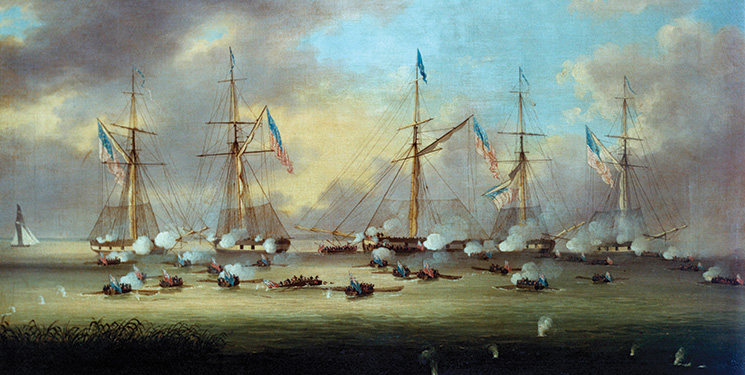Rewriting History
 |
| This painting of a War of 1812 battles graces the cover of Ronald Drez’s novel. |
If every story has two sides, the Battle of New Orleans is the poster child of storytelling.
Some regard it as an unnecessary epilogue to the War of 1812, as the treaty to end the war was signed hours after the two-week battle began. Others consider the battle to be a victorious end to the war, and an integral component of shaping both Louisiana and U.S. history.
Ronald Drez takes the latter stance. The author of LSU Press’s The War of 1812, Conflict and Deception asserts that the British strategy and the successful defense of New Orleans, through the leadership of Gen. Andrew Jackson, affirm the serious implications of the climactic battle that firmly secured the Louisiana Purchase territory for the U.S.
“It truly was the final revolution,” stated LSU alumnus Fred Atchity. LSU Foundation Board member Henson Moore, part of the commission selected to commemorate the battle’s bicentennial celebration, approached Atchity to support publication of the book, which was, at the time, not yet completed.
Atchity went a step further. He spoke with his brother, Ken, with whom he owns Atchity Brothers Entertainment. Together the brothers not only made a donation to help underwrite the book, but also hired Drez as historical advisor for his research-inspired movie they are producing.
“The book and the movie will set history straight on how important that war was, and what a great victory it was,” Fred said.
The movie is planned to begin shooting in spring 2015 and to be released for the 2015 Battle of New Orleans Bicentennial celebration.
Through the use of primary sources, Drez provides a deeper understanding of Britain’s objectives, as well as an accurate and compelling account of the battle. “Our movie is going to be authentic,” Fred shared, adding that after completion of the film, the brothers plan to send copies of both the book and the movie to high schools and colleges throughout Louisiana. “Maybe that will help teach the people in Louisiana how important the battle was.”
Reposted from LSU Foundation
Subscribe to:
Comments (Atom)










